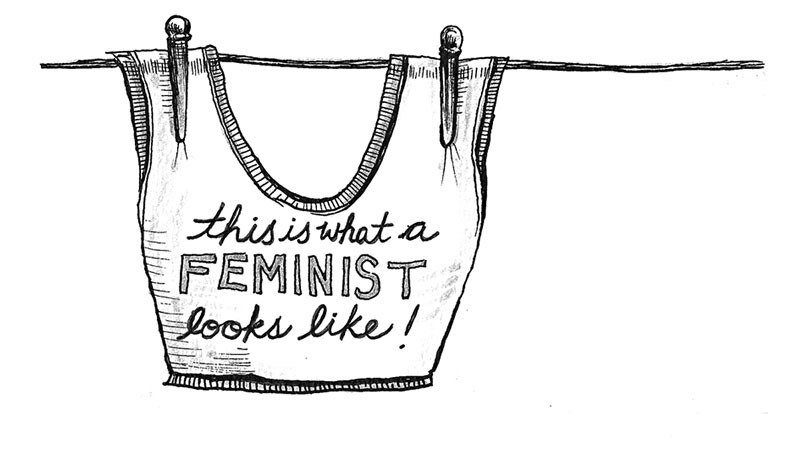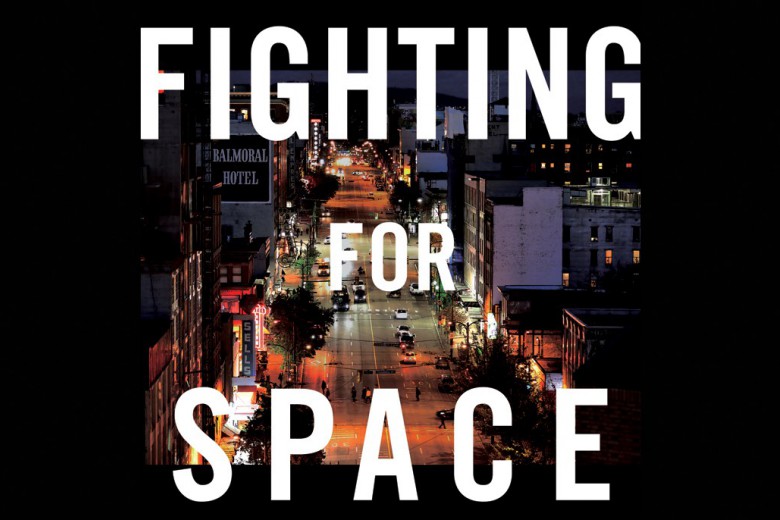
You make me want to
You make me want to
You make me want to
Crochet.
—Kathleen Hanna
Sometimes I feel like a cartoon version of a Third Wave FeministTM. I’ve got my knitting, my Peaches CDs, a bedside table full of vibrators, ironic pinup art on my fridge, and a copy of Bust Magazine on my coffee table. I realize that I’ve not been to any kind of political meeting in a while, and I worry that I’m more a demographic than a force for change.
Third-wave feminism has overlapped so much with “girl culture,” Do It Yourself aesthetics, indie-rock and burlesque that it’s hard to see where the actual movement is.
Not to discount the advances that have been made. I think that we should live in a culture that tells us that sex is cool. We should have female characters in books and movies that are complex and flawed and strong. We should be able to feel good about things like knitting and sewing, which were traditionally undervalued as “feminine.” We shouldn’t have to be so bloody earnest all the time.
On the other hand, I worry that buying a Hello Kitty toaster does nothing to address the fact that women still earn less and work more. I worry that broadening the range of body types that are sexually commodified is hardly progress. I worry that putting on a “this is what a feminist looks like” t-shirt might not bring about the radical cultural shift we’re hoping for. I also worry that this latest manifestation of feminism is as white and bourgeois as the last.
Having said all that, I still found myself really irritated by This Magazine’s May/June 2005 cover story “Feminism For Sale.” This “lost chapter” of Andrew Potter and Joseph Heath’s The Rebel Sell effectively wrote off third-wave feminism as “a feminism of cool. With its focus on individual achievement, personal responsibility and DIY entrepreneurialism, these women are doing exactly what [Naomi] Wolf suggests: They are taking control of their own psychology and engaging in strategic alliances based on economic self-interest and economic giving back. They just get to listen to cool bands and wear funky clothes while doing it.”
Of course, they were echoing some of my own concerns that we’re not doing enough as young women because we are lulled into thinking an aesthetic is the same as an action. But they also utterly discount the potential that a lot of the culture has.
I felt really conflicted about the whole question, so I shared my angst in a typically third-wave sort of way: I wrote about it in my blog. A recent online hand-wringing contained most of the concerns raised above, and the ensuing discussion really helped illuminate what it seems a lot of us are feeling: Yes we are concerned about our movement. We are also really exhausted at the notion that everyone thinks we’re doing this—whatever this is—wrong.
Here’s what we had to say.
Ariel: I feel like the crafty/sex-positive/Do-It-Yourself/_Bust Magazine_ culture is just that: a culture. And I have a problem with lifestyle politics. I remember feeling paralyzed after reading No Logo, wondering which brands were okay to buy. But Naomi Klein is the first one who will tell you that you can’t shop your way to the revolution. I would add that you can’t knit or strip your way there either.
Heather: I think it’s important to remember that Riot Grrrl culture was commodified by folks who really had nothing to do with that community. Kathleen Hanna used to confront sexist slurs by performing on stage with names like “slut” written on herself, and she later joked, “Where are my royalties from the ‘Slut’ t-shirts being sold now at Hot Topic?” As someone who ordered plenty of $5 punk rock 7”s in the early ‘90s, I know that those labels were sticking their necks out and taking big financial risks to share information and widen their circle of communication (rather than building “strategic alliances based on economic self-interest,” as Potter and Heath cynically put it).

Ultimately, I believe that contradictions in the feminist movement are a sign of diversity, not weakness. There are great heaps of room for dissenting opinions.
Jim: I think all this Do-It-Yourself stuff has become a status symbol. But more than that, it’s a hugely white-folks culture, much like punk rock, and so it turns into a lot of folks talking to people like themselves.
Del: Word. I had an acquaintance who was active in her school’s Muslim society. She was preparing some Middle Eastern food for a party. These white kids who had joined the Muslim society to “be supportive” were all like, “But where’s the vegan option? Shouldn’t you be doing x, y, z,” etc., basically telling her to re-write her culture’s cookbook to suit their ethics. I think some of them do it so they don’t have to deal with their own privilege. And, by “some,” I mean “pretty much all.”
Zoarazul: My gut reaction: keep your politics out of my yarn stash. I’m sick of explaining myself all the time. The hobbies I have, the people I love, the work I enjoy—these things defy categorization, and nothing turns me off of an ethos like feeling I need to defend my allegiance to it. If there is a third wave of feminism, I’m experiencing it thusly: Quit tryin’ to stick me in a box, you asshat.
I also bristle at the notion of “reclaiming.” We’re talking about my sexuality, right? It’s not like a mitten I left on a bus and then “reclaimed” at the lost-and-found. It is mine and it’s always been mine.
Geebengrrl: I have to admit to still being a bit sheepish about the crafty side of feminism. I love knitting, it is creatively fulfilling, but I don’t shout it out because there’s still this taboo about it being too feminine. I also love making furniture, and it’s easier to be out of the closet about that, perhaps because it’s not traditionally women’s work.
Sarah: Potter and Heath’s entire article has the same underlying agenda their book had: they’re trying to lump feminism in with other “countercultural” movements and then apply the same diagnosis to feminism as they did to hippyism, culture jamming, and the rest.
Audra: It’s true. They are entirely dismissive of the ability for culture to impact politics.
Sarah: I would be surprised if anything besides culture ever impacted politics.
Subnivean: The Rebel Sell was a waste of time. I enjoyed the premise because it was the first time I had encountered the idea that we buy the feeling that we make a difference and stand out and are unique and powerful. But they offer no solutions and dismiss certain specific things that I believe they shouldn’t.
Their problem is that they have a very simple, economically determinist model of culture. I read something the other day that called culture “the meaningful interactions between people,” but that too often gets lost in a sea of “the meaningful interactions between people and their credit cards.”
Judy: Until capitalism is defeated or collapses from its own weight, it’ll play a significant part in everything we all do. And as long as women and girls are routinely raped, harassed, threatened, coerced and objectified—and as long as this reality is suppressed, silenced and denied—sex will be fucked up. What more is there to say?
I think it’s long past time for activists in Canada to look around at what people outside our western consumerist bubble are fighting to change. And learn from it. And get moving. Maybe it’s time for us to take our cue from those life-and-death struggles.
Knitting is lovely. Burlesque is body-positive. I’m with Mae West, though: “Is That All There Is?”
But I’m also not into beating each other up over what we enjoy doing, trying to motivate people through guilt, or being lectured by guys who should know better.
Kimberly: Could we do more politically? Yes, we could. But feminism is far from being the only avenue where we need to do more. I honestly don’t think that the lack of political headway is because of any failing on the feminist movement’s part; it’s because everyone is having trouble motivating action on all of the ills of the world, and the reason why everyone is having trouble is because, by and large, human beings are lazy-ass lumps. The whole “it’s feminist cool to knit” thing is in precisely the same camp as the whole “red” marketing thing, where you can tell yourself that all you need to do to help cure AIDS in Africa is get a red hoodie from The Gap. It usually takes a lot of hard work from a lot of people to reach a critical mass on a given issue, and it also generally has to be something they cannot deny affects them.
Sarah: I grew up on the politics of second wave feminism—rape crisis centres and Ms. Magazine. As much as I can completely empathize with criticisms of a lot of what prominent second-wavers had to say, at least the issues seemed rather clear and I could really get behind at least some of them.
I’m not tempted to get a subscription to Bust because, in general, it seems to be about being cool. I used to cry over articles in Ms. Magazine; I don’t think you’d see me doing that over something in Bust or Bitch. From the limited amount I’ve seen, they’re too cool, too ironic, too hip. And that’s why Ms. was awesome and fun to read in small doses, especially when I was younger and feeling my way around the dominant culture.
Having a community and shared aesthetic and social values can be good, on one hand. It can bind you together, make you close to your fellow activists and give you support. On the other hand, it can be alienating for women who don’t fit into that community and don’t share those values.
Andrea: You know, I do all of these things and I honestly can’t say I find any of them to be “feminist.” I knit because, let’s be honest, I’m lazy and enjoy hobbies that involve sitting down. I do crafts because I like feeling like I’ve made something pretty. I wear pink because I think it’s a nice colour. I don’t like burlesque because I always just think they look cold and it isn’t actually fun for me to sit there and watch other people be sexy. I like sex because it is actually fun for me.
But to me, none of the above is “feminism.” Third-wave feminism, to me, is about choice in and of itself, not about any of the above particular choices. And the problem is that it gives the impression that we’re done. To be at a point in history where we’re all free to choose is the ideal, no? But there are lots of situations where women still have no choices, and that, I think, is where the action part comes in. Situations like pay equity, child care, violence, etc. It feels like we missed a step, or that the third wave needs an upgrade—Feminism 3.1. We have a lot of choices, and that’s really great, but there are still many issues that need real and true solutions—not just some pink, knitted arm-warmers.
Gayle: I don’t think DIY or being “housewifey” is necessarily about “reclaiming” anything. I think that staying home with the kids is as valid a choice as going out to work—for either gender. I feel like my spatial reasoning abilities and my very girly cross-stitching are both feminine—because I do them and I’m a girl. “Feminine” is not bad. To me, too, feminism is about choice: the ability to make a choice based on our own personality and needs and wants without repercussions based on gender and stereotypes.
Del: I see a lot of overlap between the first wave and the third. Instead of salons, we have stitch ‘n’ bitch. They wrote feminist theory; we’re re-writing it in a way we can understand. They lobbied for suffrage. I think mainstream western culture has gotten so oppressive that third wavers are just lobbying for some sort of cultural survival. One way this manifests is in the final knitted product, the feeling that we made something tangible, despite the horrors we see every night on the news. When your hands are too sad to write, doing something like knitting can be really healing. Lobbying for cultural survival also takes place when a third waver puts her money where her politics are—like by supporting small businesses and buying from people who share her politics.
The third wave, as I understand it, will always be largely white. Supporting people of colour means following the lead of people of colour. And as long as white people are still defining what “third wave” culture is, the third wave will not be a safe space for women of color. I think Rebecca Walker has really gotten the shaft; she was one of the first people out there using the phrase “third wave” and discussing why women don’t want to identify as feminists. But I don’t see her being talked about in the third wave very much. To that end, it is every white third-waver’s job to listen to people of colour, to call out racism and to be called out on it.
As much lobbying for cultural survival as third wavers do, women of colour have had to fight—not lobby, fight—for any sort of survival. Asking them to step into white space when we are not willing to follow their lead is asking way too much.

Katherine: Feminism isn’t made of knitting and vegan muffins; feminism is made of strong, insightful women. And these strong, insightful women—the ones who will publicly identify as feminists—have a tendency to also believe in things like sex positivity and eating organic/vegetarian/vegan food. I think it’s a sign that feminism has become a theoretical ideology as opposed to some kind of a focused political movement that it has gathered a culture around it.
Shpyum: This is a great example of how we are still assuming we are unequal. We, as women, are still going around acting as if our power is all sexual, as if our political, social, cultural worth is all based on our sexual attractiveness, decisions, orientation. I understand being proud of our sexuality, but how is it not a giant step back to try and get a job with our breasts instead of our talent?
Constance: I belong to a burlesque troupe in Toronto and these are precisely the issues that get me up in front of the footlights. Without the opportunity to earn a living, women have historically found their sexuality reduced to an item for exchange, either in marriage (sex in exchange for shelter and a meal ticket) or sex work (sex in exchange for money used to buy shelter and a meal ticket).
I’m interested in what women’s sexual expression would be like if they didn’t need the money. Hence burlesque.
Unfortunately, burlesque isn’t an unmitigated feminist success. Most troupes (mine included) perform campy impressions of pin-up girls from the bad old days. Referencing June Cleaver, even in her skivvies, is glorifying a femininity that was toxic for women. And, of course, in stripping down we are encouraging the audience to think of women in a purely sexual manner.
Burlesque does nothing to bring about the substantive change in women’s lives in the way that socialized childcare, true employment equity, pensions for homemakers, and adequate funding for shelters would.
Burlesque is just the roses; we need to attend to the bread too.
Audra Williams works in Ottawa as web editor for the Canadian Union of Public Employees, although her heart is in north-end Halifax. She has never knit a vibrator cozy.






